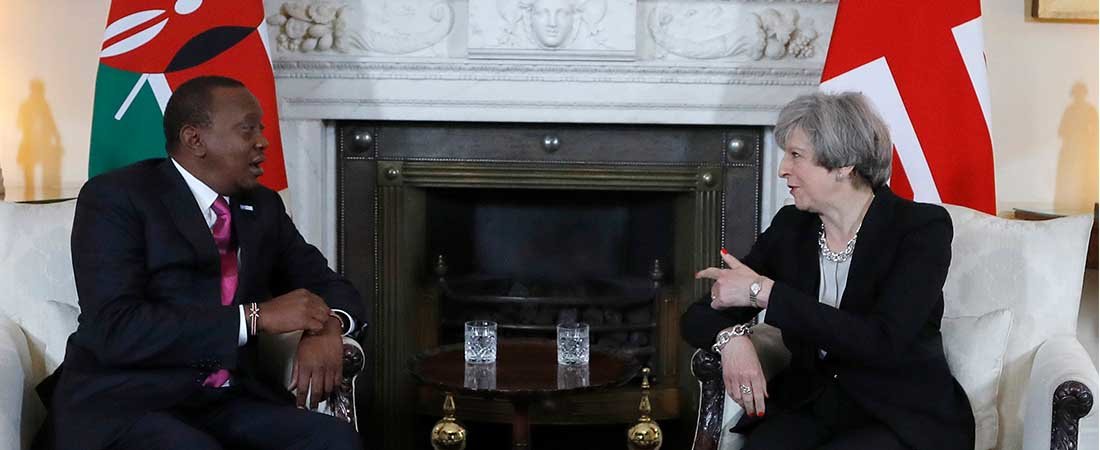This week, Theresa May becomes the first British Prime Minister to visit Kenya in over 30 years. The historical ties that connect these two nations mean that such an event would always hold special significance. However, today’s meeting with President Kenyatta comes at a time of profound transformation for both countries, presenting new opportunities for growth and collaboration.
Much has changed since the last time a sitting British Prime Minister visited. Kenya has developed into a dynamic digital economy, with a vibrant democracy and assertive foreign policy. This new role in the world has placed Kenya at the forefront of a rapidly changing continent. In the UK, the prospect of Brexit has caused a dramatic rethink of international relations that hasn’t been seen since the 60’s.
This trip has been more than a basic exercise in diplomacy. It is the embodiment of the new “Global Britain” strategy – which has often been accused of lacking substance and concrete examples of how it will work in the practice. The UK Government will hope today’s meeting proves fruitful, and that Kenya can become the poster child for an exciting new international trade policy.
Accompanied by a large delegation including the Ministers for Trade and Africa, the Lord Mayor of London, and 29 leaders from the business community; Theresa May’s message to Kenya is clear: the UK is open for business and it brings investment, knowledge and unique expertise.
This is the opportunity Brexit brings to African countries – and which has often been overlooked by commentators focused on the politics and implications around the decision.
The UK has been a reliable partner to African countries for many years. While China and the US are linked to significant infrastructure and development projects, the UK is the largest cumulative investor in Kenya. The two largest private sector employers are UK companies. And UK companies make up half of the top ten biggest taxpayers. In trade, the UK is a significant market for Kenyan tea, cut flowers and food crops, while Kenya is a key African market for UK products and services.
Ahead of the trip, May flagged the UK’s ambition to be the G7’s number one investor in Africa, with Britain’s private sector leading the charge. Commitments were quick to follow: while in Cape Town, the Prime Minister announced direct investment of £4 billion. The British private sector is expected to contribute an equal amount.
With the Kenyan Government focused on delivering its Big Four Agenda, this official visit couldn’t have come at a better time.
Consider agriculture. While the UK is likely to prioritise trade deals with the US, Australia and New Zealand, Kenyan farmers could also benefit from new trade agreements. These agreements could combine improved market access and new investment to boost farm production enhance local processing.
It is not just farmers who could benefit. The Kenyan government is working hard to grow the local manufacturing sector from less than ten per cent of GDP to 20 per cent by 2020. This is an ambitious goal, which has been warmly received and supported by the local sector – and which opens new opportunities for British investors looking to enter the dynamic Kenyan market.
There are also opportunities to unlock innovation through closer ties with the UK’s tech sector. While Nairobi is a leader in Africa’s digital transformation, London is a world leader. Expertise, knowledge and investment could help Kenya grow its role as Africa’s innovation hub.
However, it is not all blue skies and sunny days. The real risk for Kenya lies in the impact Brexit could have on the UK economy. A weaker economy could reduce demand of price sensitive exports such as cut flowers, while a weakening of the pound would impact on the competitiveness and profitability of some local exporters – not to mention the ability of the UK Government to follow through on their commitment to invest across Africa.
For Kenya, Theresa May’s visit this week needs to be seen for the opportunity it is. With Brexit drawing closer, the UK government is eager to build deeper ties with old and new friends to demonstrate the potential of the “Global Britain” strategy. In this realignment of Britain’s foreign policy priorities, Kenya holds excellent cards and stands to benefit.
Kenya’s historical ties, stable and growing economy and natural resources place it in a good position to grow its trade and business relations with the UK. But Kenya isn’t alone. Other governments and companies have sensed the Global Britain opportunity. Therefore, this visit should be used to build momentum and a case around a new partnership with the UK. With the right advice and insights, you can navigate through the chaos and unlock the investment and prosperity from closer ties with a post-Brexit UK.

